The ‘best of the profession’
are honored for pro bono work
One lawyer helped adults who have overcome addictions and want to start a new life. Two took on the legal problems of the homeless. One fought for the right of the blind to have equal access to Social Security programs. Law firms assisted foster parents with reimbursement rates and low-income people on everything from unlawful detainer and debt collection to evictions and domestic violence. And all for free.
Such actions represent the commitment of the nine recipients of the State Bar’s 2010 President’s Pro Bono Service Awards, which recognize California attorneys, law firms and associations of California lawyers who contribute to the delivery of legal services to the poor and those who represent the poor. The awards were presented at the State Bar’s Annual Meeting last month in Monterey.
“The recipients of the State Bar’s 2010 President’s Pro Bono Service Awards represent the very best of our legal profession,” said former President Howard Miller. Noting that two-thirds of Californians who need legal services cannot afford them, Miller added, “Their only hope is that all California lawyers will follow the lead of these honorees and dedicate themselves to ensuring that our system serves not just paying clients but every Californian whose rights depend on the courts.”
The 2010 Pro Bono award winners and their award categories are:
- Deborah Jurgensen, Ventura — Solo Practitioner;
- Christina Brown, San Francisco — Newly Admitted;
- Thomas Theisen, San Diego — Limited Active Practice;
- Henry Su, East Palo Alto — Law Firm Individual;
- Coblentz, Patch, Duffy & Bass LLP, San Francisco — Law Firm;
- Jones Day Advocate Team, Los Angeles — Law Firm Team;
- Morrison & Foerster, Palo Alto — Law Firm Team;
- California Western School Law, San Diego — Law School;
- South Asian Bar Association of Northern California Pro Bono Committee, San Francisco — Distinguished Pro Bono Service
SOLO PRACTITIONER
 |
| Deborah Jurgensen |
Deborah Jurgensen hasn’t wasted a moment in helping those who can’t afford legal services. As soon as she was admitted to the State Bar in 2007, after earlier careers in bookkeeping and design, Jurgensen signed up with the Volunteer Lawyer Services Program of the Ventura County Bar Association and accepted six legal matters, compared to the average two that most attorneys take on. She also founded the Ventura Teen Legal Clinic, which she continues to run. She is known for her patience and hard work with young people who don’t always want her help — troubled youth, the mentally ill and those with substance abuse problems. Jurgensen, 52, devotes half her practice to pro bono work, including child custody and expungement of criminal convictions for former addicts who turned their lives around.
NEWLY ADMITTED
 |
| Christina Brown |
The Homeless Rights Project of the Lawyers’ Committee for Civil Rights of the San Francisco Bay Area has been a beneficiary of Christina Brown’s commitment to pro bono work. An associate in the White Collar Defense and Antitrust and Competition departments at O’Melveny & Myers LLP in San Francisco, she serves on the office’s pro bono committee and has devoted much of her time to helping the homeless. Brown, 29, has handled almost 200 cases and appeared in court 30 times on behalf of clients seeking dismissals and suspensions of fines related to “quality of life” violations such as sleeping in public. If left unpaid, those fees prevent homeless people from getting such services as drug and alcohol treatment, mental health care, disability benefits and permanent housing. Brown has taken on nine appeals since beginning with the project in 2006, far more than any other Homeless Rights Project volunteer attorney.
LIMITED ACTIVE PRACTICE ATTORNEY
 |
| Thomas Theisen |
Under Thomas Theisen’s leadership, the Homeless Advocacy Program (HAP) of the Legal Aid Society of San Diego has grown from two to 25 volunteers, from one clinic to three plus a clinic devoted specifically to Supplemental Social Security issues. Theisen, 54, a retired patent attorney, leads a program dedicated to helping the homeless both on the streets and in the St. Vincent de Paul Village in downtown San Diego and other shelters. He emphasizes to volunteers the necessity of listening to determine what services and legal help are needed, from mental health counseling to restoring much-needed Social Security and disability benefits withdrawn because of outstanding warrants.
LAW FIRM INDIVIDUAL
A successful class action lawsuit filed by Henry Su has meant the difference for millions of blind and visually impaired people in being able to fill out Social Security Administration (SSA) forms in a timely manner. A partner at Howrey LLP in intellectual property and antitrust claims, Su worked on 15 pro bono cases in 2009, with the suit against SSA the most prominent. Filed on behalf of the American Council of the Blind and 3 million people with diminished sight, the suit argued that visually impaired SSA recipients were at a disadvantage because forms and critical notices were not available to them in anything but print. The judge in the case agreed with the plaintiffs, declaring that, at a minimum, the notices and forms should be available in Braille and a CD format.
LAW FIRM
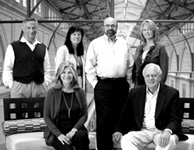 |
| Top: Jon Eldan, Mee Mee Wong, Jeffrey Maso, Karen Nelson; Bottom: Pamela Duffy, Frederick Fields |
Continuing a 100-year tradition of pro bono work, Coblentz, Patch, Duffy & Bass LLP in 2009 logged more than 4,700 pro bono hous assisting poor and low-income people and organizations serving the poor on legal issues ranging from unlawful detainer, debt collection and administrative agency disputes to evictions and business transactions. The lawyers also staff tax clinics for low-income people from February to April 15. Much of the pro bono work was done through the Lawyers’ Committee for Civil Rights of the San Francisco Bay Area. Firm lawyers helped expunge the criminal records of eight individuals who have turned their lives around but find it difficult to get work, and they represented an inmate whose substandard health care has created lasting pain and suffering. The firm regularly exceeds its pro bono goals.
LAW FIRM TEAM
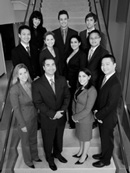 |
| Top: Rachel Tessa Gezerseh, Jason Wright, Christopher Dengler; Middle: Stephen Ng, Catherine Broderick, Shirin Nassi, John Ly; Bottom: Anna Raimer, Brian Hershman, Courtney Chavez, Jason Liang |
With only a few days’ notice, a member of Jones Day’s Advocate Team is in court arguing for a permanent restraining order against a perpetrator of domestic violence on their client. Through the Los Angeles Center for Law and Justice’s Advocacy in Domestic Violence and Custody Trials, Jones Day lawyers are helping fill a longtime need for quick action in domestic violence cases. Temporary restraining orders have been fairly easy to obtain, but low-income immigrants who don’t speak English have had a more difficult time obtaining permanent restraining orders. Eighteen Jones Day attorneys are on call to help victims obtain permanent restraining orders that provide up to five years of protection. The firm’s help often extends beyond the restraining order to child custody and support hearings. Team members also handled cases involving prisoners’ rights, landlord-tenant disputes and immigrant status.
LAW FIRM TEAM
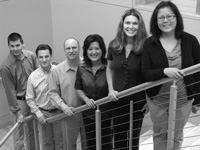 |
| L to R: Mark Smoot, Rick Ballinger, Marc Peters, Loraine Lontayao, Kim Van Voorhis, Nancy Hoang |
A successful suit filed against the State of California by the Morrison & Foerster Foster Parents Team and the Children’s Advoacy Institute at the University of San Diego law school resulted in increased reimbursement rates for basic necessities for federally qualified foster children. The judge in the U.S. District Court case ruled that California’s rates were deficient by up to 40 percent and the case has been cited in other court actions seeking higher rates. The state has appealed the ruling and a decision is pending. In its work both on the case and the appeal, Morrison & Foerster attorneys donated almost 2,000 hours of time.
LAW SCHOOL
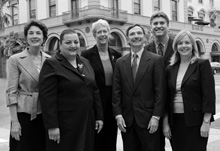 |
| L to R: Linda Morton, Anaheeta Kolah, Jill Blatchley, Steven Smith, Justin Brooks, Courtney Miklusak |
For the first time, the pro bono awards include law school nominations. California Western School of Law took the inaugural award in the law school category because of its Pro Bono Program, Community Law Project and California Innocence Project. Working with the San Diego Volunteer Lawyer Program, law students are placed at one of more than 25 nonprofit groups to get a start at pro bono work. They may work to free inmates who have been wrongly convicted, offer help to the homeless or aid organizations offering services related to immigration, affordable housing, domestic violence and civil rights. Students who complete 50 hours of pro bono work are inducted into the Pro Bono Honors Society and given a notation on their transcripts and certifications of completion, along with a letter of appreciation from the dean of the law school.
DISTINGUISHED PRO BONO SERVICE
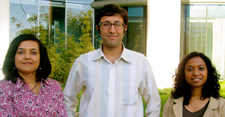 |
L to R: Suchitra Narayen, Hozefa Botee,
Mythily Sivarajah |
“Know your rights” seminars, free legal seminars and a legal newspaper column for mostly low-income immigrants who do not speak English helped earn the South Asian Bar Association of Northern California Pro Bono Committee (PBC) the Distinguished Pro Bono Service Award. The committee was formed to give South Asians access to the justice system, but the program has expanded to other immigrant communities as well. The MCLE training for lawyers has focused on civil rights, employment law and and other topics and increases the number of attorney volunteers able to help the targeted communities.